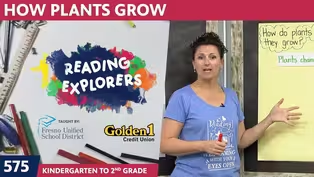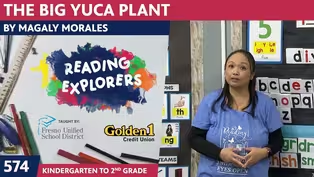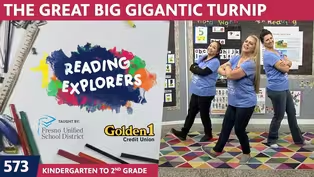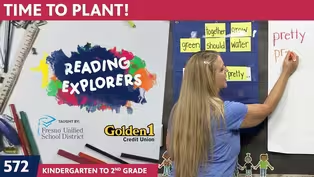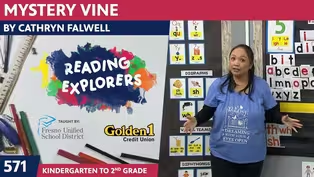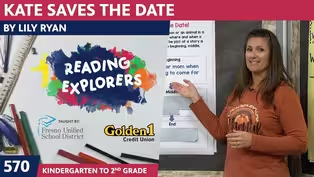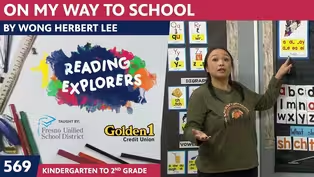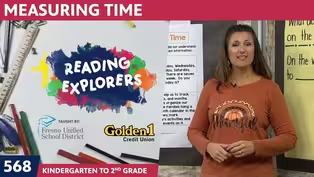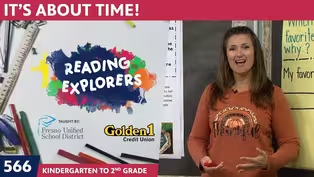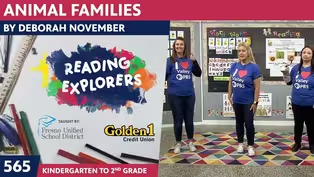
3-358: Prefixes, Suffixes & Homophones
Season 3 Episode 325 | 14m 10sVideo has Closed Captions
Join Mrs. Nix at Camp Discovery!
Third Grade teacher, Mrs. Nix, welcomes students back to Camp Discovery, a fun learning space packed with reading adventures & fun games!
Problems playing video? | Closed Captioning Feedback
Problems playing video? | Closed Captioning Feedback
Reading Explorers is a local public television program presented by Valley PBS

3-358: Prefixes, Suffixes & Homophones
Season 3 Episode 325 | 14m 10sVideo has Closed Captions
Third Grade teacher, Mrs. Nix, welcomes students back to Camp Discovery, a fun learning space packed with reading adventures & fun games!
Problems playing video? | Closed Captioning Feedback
How to Watch Reading Explorers
Reading Explorers is available to stream on pbs.org and the free PBS App, available on iPhone, Apple TV, Android TV, Android smartphones, Amazon Fire TV, Amazon Fire Tablet, Roku, Samsung Smart TV, and Vizio.
Providing Support for PBS.org
Learn Moreabout PBS online sponsorshipMore from This Collection
Valley PBS and Fresno Unified School District have partnered with Golden 1 Credit Union to create Reading Explorers Lessons for grades Pre-Kindergarten through Third grade. The daily lessons will be taught by Fresno Unified School District teachers and are created to help students practice their reading skills and reinforce lessons during distance learning.
Video has Closed Captions
Learn about the life cycle of a plant on Reading Explorers. (26m 39s)
K-2-574: The Big Yuca Plant by Magaly Morales
Video has Closed Captions
Join the Reading Explorers as we adventure into a new book The Big Yuca Plant. (26m 30s)
K-2-573: The Great Big Gigantic Turnip
Video has Closed Captions
What will happen at The Great Big Gigantic Turnip? (26m 30s)
K-2-571: Mystery Vine by Cathryn Falwell
Video has Closed Captions
The Bell has rung and the Valley PBS Classroom is open once more. (26m 32s)
K-2-570: Kate Saves The Date by Lily Ryan
Video has Closed Captions
Mrs. Nix, Mrs. Hammack and Mrs. Vang are glad to have you join her for a new day. (26m 32s)
K-2-569: On My Way To School by Wong Herbert Lee
Video has Closed Captions
Mrs. Vang is ready for a new day of phonemic awareness and reading comprehension. (26m 40s)
Video has Closed Captions
We review phonics, frequency words and more on Reading Explorers. (26m 45s)
K-2-567: Nate The Snake Is Late
Video has Closed Captions
What happens when Nate the Snake is late to school? (26m 49s)
Video has Closed Captions
It's time for school! How do you know what time it is? (26m 31s)
K-2-565: Animal Families by Deborah November
Video has Closed Captions
Welcome to the Reading Explorers lessons in the Valley PBS Classroom. (26m 14s)
K-2-564: From Caterpillar To Butterfly
Video has Closed Captions
The transformation from Caterpillar to Butterfly is a special one. (26m 52s)
Providing Support for PBS.org
Learn Moreabout PBS online sponsorship♪ Good morning to a brand new day ♪ ♪ Time to learn and games to play ♪ ♪ Learning things is so much fun ♪ ♪ Learning is good for everyone ♪ (bright music) - Good morning third grade, my name is Mrs. Nixon.
I am so excited to be here and support you as you become amazing thinkers, readers and writers.
This morning, I was reading the back of this book, this book is called Kid Spy.
I'm just gonna read it to you 'cause it makes me wanna read it, and I bet if I read it, you're gonna wanna read it.
So this one says, "My name is Mac Barnett, "I'm an author, but before I was an author, I was a kid.
"And when I was a kid, I was a spy.
"This is the top story of a bird napping.
"It's got spy craft, horse chases, "fake wrestling, real wrestling, "and the ultimate smackdown on a submarine.
"Open the book to find out more about my adventures.
"But beware, this mission is top secret and very dangerous."
So, guess what I'm gonna be doing today?
I'm gonna be checking out this story.
Now, you know where you can find this story and others that are just like it?
You can do that by visiting your County Local Library, or in Fresno Unified we love to check out our books using the app, Sora.
So jump on there and check out a book today, it would be awesome.
Another fun adventure that we have here at PBS, we have these awesome little activity books, they are full of word searches, mazes, and other puzzles.
And if you would like one, it's really easy to get, you're gonna see an address that's gonna pop up there on the bottom of the screen, and you just need to send me a note and include your address.
Maybe you wanna tell me about a fantastic book that you are reading right now, and we can share it with other third grade friends.
Don't forget to include your address so that I can put one of these in the mail for you.
All right, so third grade, today I have three things that we're gonna go through today.
We're gonna look at some prefixes and suffixes, open syllables and finish off with homophones.
Are you ready to start?
Awesome.
Okay, let's start by warming up just like runners do, we've got to do some stretches.
So, good readers, we always make sure that we kind of warm up those super smart, our smart muscles, our brains.
Let's look at those high frequency words.
Let's go through and read them, and then we're gonna use a couple of them in a sentence.
So join me, read them big and loud at home and I'm gonna read them here.
From, full, gave, funny, get, give, go, goes, good, and going.
Nicely done.
Okay, our two that we're gonna focus on today are get, G-E-T, and give, G-I-V-E. Help me use them in a couple of sentences here.
Did you, hmm, wet out in the storm?
And, I try to, hmm, good advice to my friends.
Hmm, I try to, do you try and ever give your friends good advice.
I try to give my friends good advice.
So that makes sense.
Did you get wet out in the storm?
Ooh, I hope not.
Hopefully, you were able to stay dry.
Okay, let's start talking about some of the things we're gonna do today.
So the first one, we're gonna talk about prefixes and suffixes.
Now, in the previous weeks we've been talking about either prefixes or suffixes.
Today, we're putting them all together.
And so, to help us do that, I've got kind of a little chart here with a couple of prefixes and a few suffixes and we're gonna build some words together and see how the meanings change.
Now, remember, a prefix, it's just a group of letters that change the meaning of a base word.
Same with the suffix, it's found at the end of a word and it does the same thing, they don't stand on their own.
The only thing that really can stand on its own are these base words.
Base words have their own meaning and they are complete words.
Okay, what do I mean by that?
Let's look.
So our base words today are happy, help and believe.
These all stand alone.
When we look at our prefixes and suffixes, today we've got re, which is gonna change the word to mean again, and un, which means not.
Jumping all the way over here to our suffixes, we're gonna see that we have ly, which means in a certain way, ful, which means that it's full of, and able or able, it means capable or able to.
Okay, let's practice.
So, if I have the word happy, I could talk about how something was done or how somebody behaved when they completed a task.
And I could say that she very happily did something.
It's in a certain way.
How did she do it?
Well, she did it happily.
Now, you're gonna see here I've got a little tricky little card here where I can change my y to an i before adding that ly, because happy ended in a y.
So, happily.
So she happily did her homework, okay?
It's telling us how she did it.
Now, if I wanted to do something that was the opposite of happily, what would it be?
Well, not happily, right?
So I can add the prefix un.
She unhappily did her homework, right?
All right, that's telling us the complete opposite of what we had before.
Because not, basically turns that word to mean the opposite.
Okay, so, we've got a prefix and a suffix.
Let's do another one.
Here's help.
Now, if I wanna say that somebody is full of help, I could say that they are very helpful.
The boy was very helpful when we were taking the groceries out of the car, right?
Now, maybe his sister was the opposite, and she was very unhelpful.
She was not full of help.
Does that make sense?
Look at how we were able to build that word.
And we can chunk it.
We're training our brains to be able to see these prefixes and suffixes and our base words.
Let's do one last one.
Here's the word believe.
Now if I wanna say something was very believable, I'm actually gonna cover up that e, and I've got believable.
But if I wanted to say maybe it's not believable, I'm not able to believe something.
Again, I can move my un and it becomes unbelievable.
See how easy it is to change the meanings of words just by playing with our prefixes and suffixes.
This is an activity you can do at home.
You can put all of these prefixes and suffixes and move them around and play games, maybe while you're waiting for dinner to be prepared.
Just an idea.
Okay, let's switch gears just a little bit and talk about open syllables.
Now, an open syllable, or anytime we're dealing with syllables, we always are, essentially we're listening for that vowel sound.
You could put your hand underneath of your chin, every time that your chin comes down, you have, that's when you have that vowel sound, okay.
In a word, every syllable has a vowel sound.
So, when we're looking at a word, that's our first place that we start when we're trying to decide where do we divide words into syllables.
So let's look for vowels.
What's a vowel?
That's right, a, e, i, o, u, okay.
So let's look, oh, and sometimes y, I hear you, good job.
So, do we see a, e, i, o, u?
Yes, we see an o and an a.
So these are our two vowels.
Now, anything that's in between would be consonants, right?
So I'm gonna put a c for a consonant.
Now, because I only have one consonant, I know that I'm gonna split right in front of that consonant right there, and that's gonna make this first syllable an open syllable and that vowel is gonna say its name, it's gonna be a long vowel.
Po, lar, polar, like a polar bear, right?
Okay, let's do another one.
So, looking for my vowels, that's the first thing I do, look for my vowels, I'm gonna mark them with a v for a vowel and a c for my consonant.
I'm gonna split it right in front of that consonant 'cause I only have one.
Remember when we've got the closed syllables we've got two consonants in between, now we only have one, so we cut, we split it right before that consonant.
And that's gonna make this syllable an open syllable because it ends with a vowel which makes that vowel say its name.
Ti, ger, excellent.
Okay, what does it look like when we're practicing?
So looking here, I've got a couple of words that are next to each other.
And we're looking for the words that have those open syllables.
So, when I look right here, I've got giant and silver.
Okay, remember, what's the first thing that we're gonna do?
We're gonna look for those vowels.
Well, on this one, look, I've got i an a, so vowel and vowel.
Well, I've gotta split those two vowels, they can't be in the same syllable.
Every syllable has a vowel sound.
So I'm gonna have gi, ant.
Okay, is that an open syllable?
It is.
But just to make sure, I'm gonna come over here and just look, do I have a vowel?
Yep, I've got two of them.
I've got vowel, vowel, ooh, but look, I've got consonant and consonant.
Because I've got those two consonants together, I need to split them.
So sil, ver, this is an, closed syllable.
So that's not what we're looking for, okay.
So that's something that you would easily be able to practice.
Let's do one more.
We've got parking and paper.
So find the vowels, mark them, vowel, vowel, put your consonants.
So we've got park, ing, park, ing, good.
And then we've got pa, per, vowel, vowel, consonant, split right there, pa, per.
This is our one that has the open syllable right there.
Okay, let's jump down below and start talking about some of those prefixes and suffixes.
Now this, we're gonna be thinking about, what do those prefixes and suffixes mean, and what is the, kind of this mystery, we got to find the mystery word here.
So if something is not willing, hmm, not willing, we know that it's unwilling, right?
So do we see unwilling up here?
Yeah, right here.
Something is not willing, they're unwilling to do it.
To make it again, hmm.
Well, make, and again was re, so how about remake?
Do we see remake?
Here it is, remake.
We're making it again, great job.
I'm gonna finish off today with some homophones.
And I've got two of them right here.
Won and one.
Everybody take your hand go like this, homophones, that means that we're listening for the sound.
They don't look the same won and one, and they don't mean the same but they sound the same.
Help me read this sentence.
One thing that the electric car needs is to be charged.
So what does that one mean?
Does it mean to do better than any other in a race or a contest?
Hmm, No.
Is it something difficult?
Hmm, no.
Is it a single thing or a unit?
One thing that this particular electric car needs is to be charged.
So it's a single event.
This one is when they win a contest.
Awesome job third grade.
We have done so much today.
We went through, we talked about prefixes and suffixes, open syllables, and then finished off a little bit with our homophones.
So I just wanted to say, thanks for hanging out with me today as you're getting ready for school.
And remember, you are responsible for your learning success.
So, listen, ask questions and share your ideas because together, we can do so much more.
I hope you have a fantastic afternoon.
Practice, practice some of these skills that we did today.
And I know that you'll be ready to get back here tomorrow on PBS.
Have a great afternoon.
See you then, bye bye.
(bright music) ♪ Good morning to a brand new day ♪ ♪ Time to learn and games to play ♪ ♪ Learning things is so much fun ♪ ♪ Learning is good for everyone ♪ (bright music)
Support for PBS provided by:
Reading Explorers is a local public television program presented by Valley PBS
